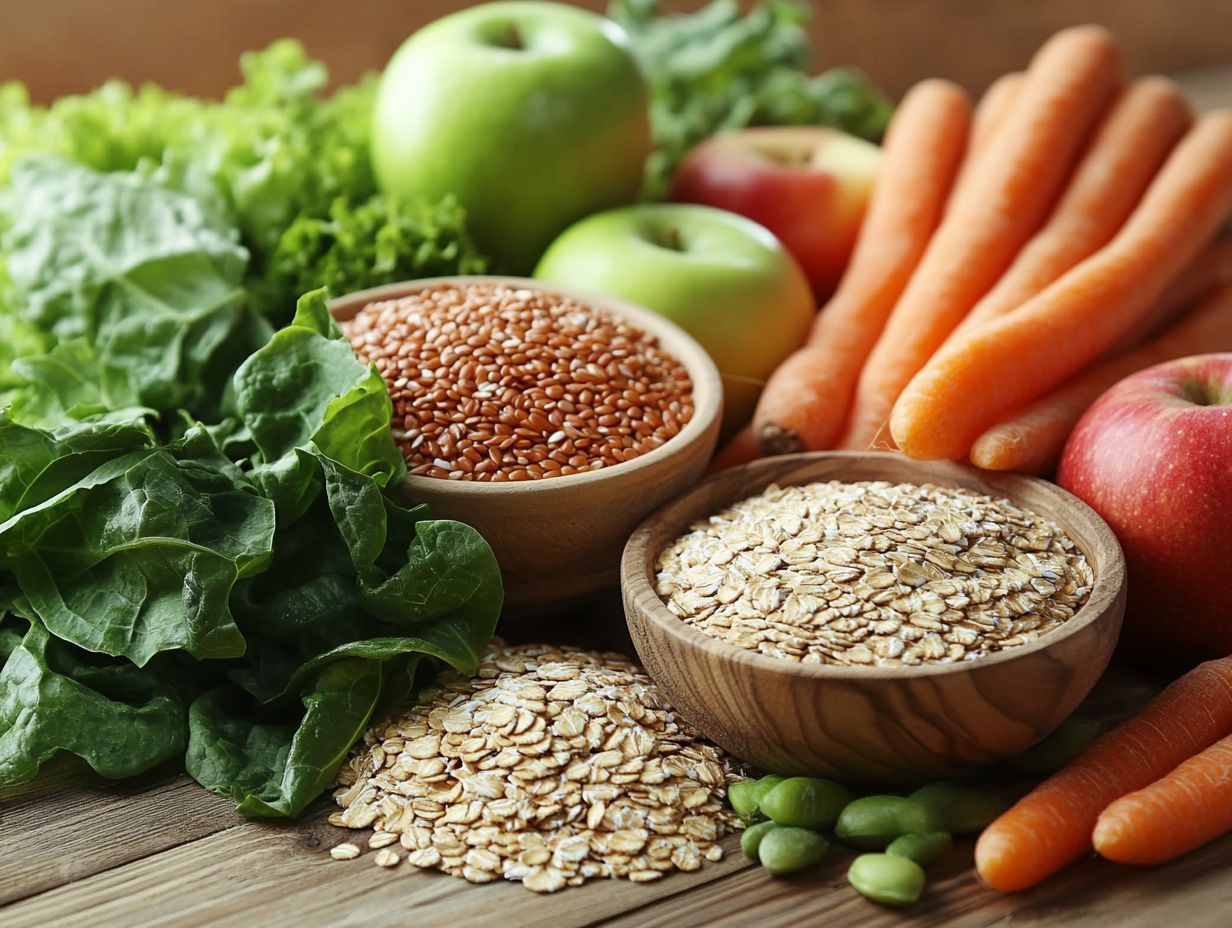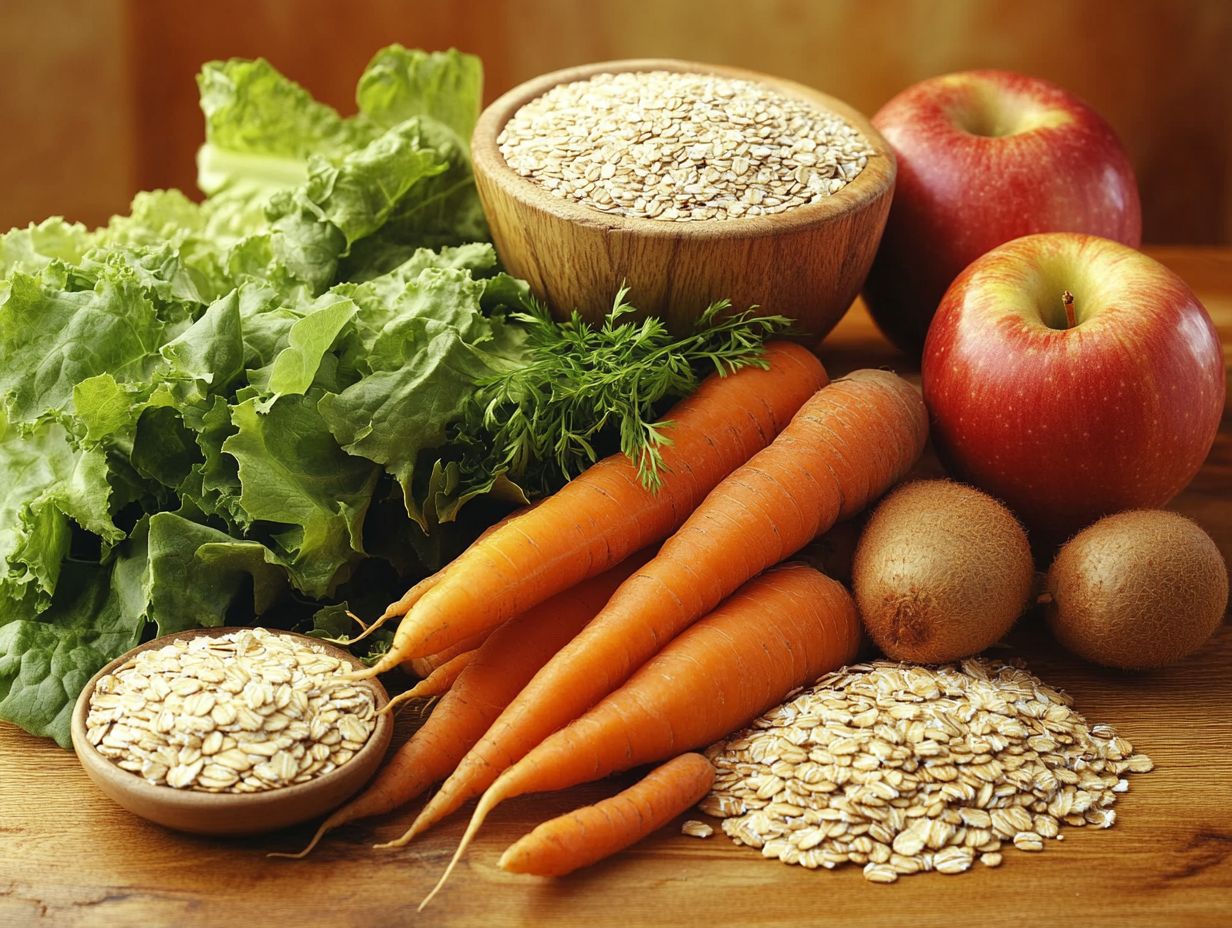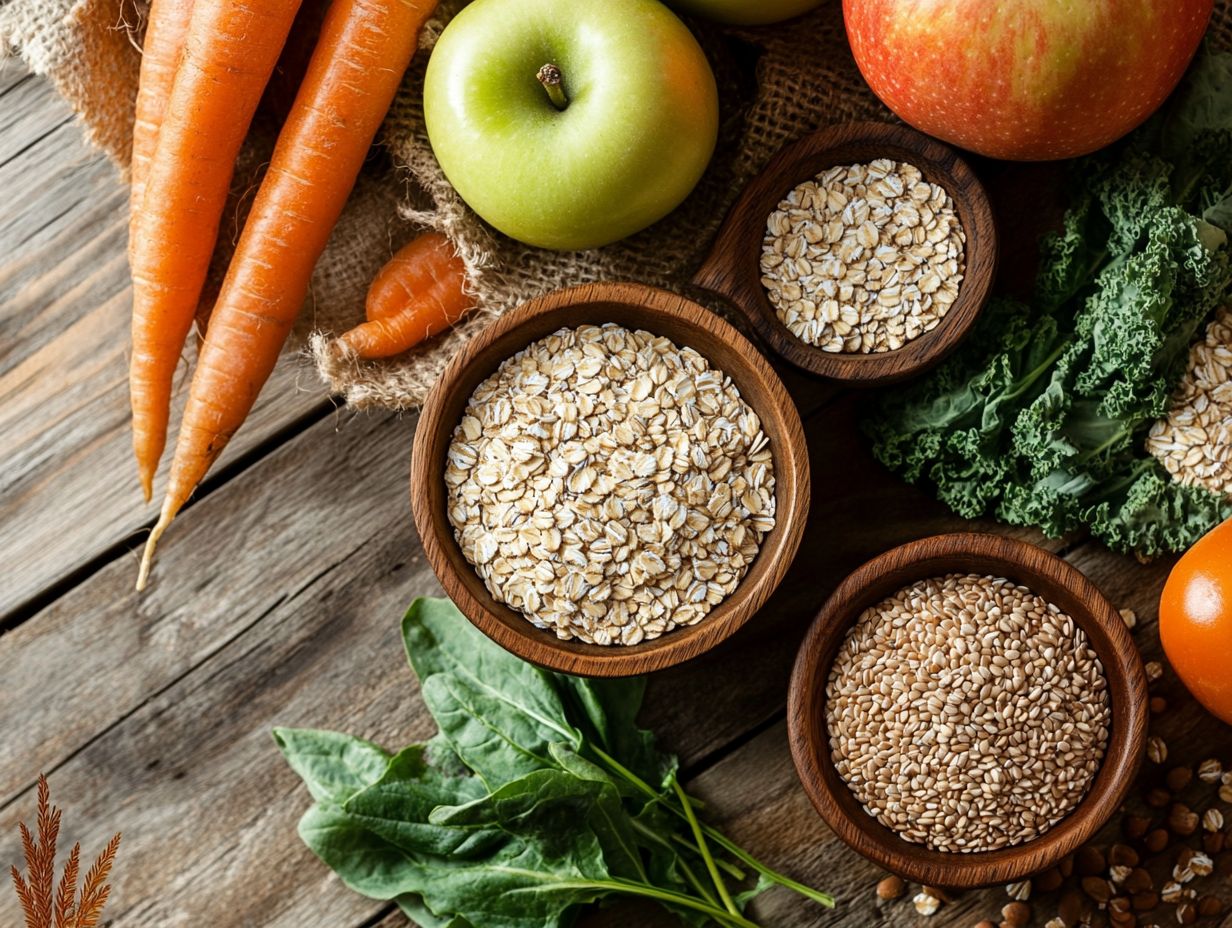What Is the Role of Fiber in Holistic Nutrition?
Fiber often doesn t get the spotlight it deserves in nutritional discussions, yet its role in holistic health is nothing short of essential.
As you explore holistic nutrition, you’ll uncover the vital importance of fiber for your physical health and overall well-being. This article breaks down the various types of fiber, highlighting their unique benefits and guiding you on how to ensure you’re incorporating enough into your diet.
Discover the strong link between fiber and gut health, illustrating how it impacts digestion and the microbiome.
Ready to transform your nutrition? Let s jump right in!
Contents
Key Takeaways:

- Fiber is a crucial component of holistic nutrition, which focuses on nourishing the mind, body, and spirit. It plays a vital role in maintaining overall health and wellness.
- There are two types of fiber: soluble and insoluble, each with their own unique benefits. Incorporate a variety of high-fiber foods into your diet to reap the full range of advantages.
- The recommended daily intake of fiber varies based on age and gender, but most adults should aim for at least 25-30 grams per day. Increasing fiber intake can positively impact gut health and digestion.
The Importance of Fiber in Holistic Nutrition
Fiber is crucial in holistic nutrition, serving as a cornerstone for your overall well-being and supporting a range of bodily functions, especially regarding gut health. Understanding what role whole foods play can further enhance your approach to nutrition.
It aids digestion, helps regulate blood sugar levels, and contributes to balanced cholesterol levels. This makes it essential for anyone looking to enhance their health and reduce the risks linked to chronic diseases like heart disease, type 2 diabetes, and colorectal cancer.
By incorporating a diverse array of fiber-rich foods into your diet, you can significantly boost your nutrient intake and optimize the efficiency of your gut microbiome, while aligning with dietary recommendations set by health professionals.
What is Holistic Nutrition?
Holistic nutrition offers you a transformative approach to health and wellness that harmonizes mind, body, and spirit through a balanced diet of whole foods brimming with essential nutrients.
This approach prioritizes unprocessed, nutrient-dense foods such as fresh fruits, vibrant vegetables, hearty whole grains, lean proteins, and healthy fats. By focusing on these food sources, you nurture your physical health while cultivating mental clarity and emotional well-being.
Holistic nutrition encourages you to find balance, urging you to listen to your body s needs and craft personalized dietary guidelines. Incorporate a diverse array of foods to maximize health benefits.
When your diet, environment, and emotional state are in harmony, you can truly thrive!
Why Fiber is Essential in a Holistic Diet
Fiber is an essential component of a holistic diet, offering a wealth of health benefits that enhance your overall well-being. It promotes improved digestive health, better blood sugar regulation, and significantly reduces the risks associated with chronic diseases such as heart disease and colorectal cancer.
This vital nutrient comes in two distinct forms: soluble fiber and insoluble fiber, each contributing uniquely to your optimal health.
Soluble fiber, found in nourishing foods like oats and beans, slows digestion and effectively lowers cholesterol levels, thereby supporting heart health. Conversely, insoluble fiber, present in whole grains and various vegetables, promotes regular bowel movements and helps prevent constipation.
Together, these fibers work in harmony to enhance gut health and stabilize blood sugar levels, making them critical allies in managing diabetes and reducing the likelihood of chronic conditions. Embracing fiber in your diet is not just a choice; it’s a commitment to a healthier, more vibrant life.
Types of Fiber and Their Benefits
Understanding the different types of fiber soluble and insoluble is essential for unlocking their full health benefits. Each type plays a distinct role in promoting digestive health and enhancing your overall well-being.
Soluble vs. Insoluble Fiber

Soluble fiber dissolves in water to create a thick mixture that aids digestion, lowers cholesterol levels, and helps regulate blood sugar. Insoluble fiber adds bulk to your stool and promotes regular bowel movements.
This action enhances your digestive health and contributes to a satisfying feeling of fullness, a key factor in weight management. Eat a variety of both types of fiber for optimal wellness.
Foods rich in soluble fiber include:
- Oats
- Beans
- Apples
- Citrus fruits
These foods help control blood sugar spikes after meals. Meanwhile, insoluble fiber is predominantly found in:
- Whole grains
- Nuts
- Seeds
- Vegetables like broccoli and carrots
Incorporating these foods is essential for preventing constipation and maintaining gut health. Striking a balance between both types of fiber enhances your dietary guidelines and supports long-term health benefits.
Health Benefits of Each Type
Each type of fiber offers distinct health benefits. Soluble fiber assists in lowering cholesterol levels and managing blood sugar, while insoluble fiber promotes digestive health and prevents constipation.
Research shows that including these fibers in your diet can elevate your overall well-being. For example, soluble fiber, found in foods like oats and legumes, lowers the risk of type 2 diabetes by enhancing insulin sensitivity, as detailed in a study published in the Journal of Nutrition.
Insoluble fiber, abundant in whole grains and vegetables, is crucial for maintaining healthy bowel movements, thereby reducing the risk of colorectal cancer. Aim for a daily intake of at least 25 grams for women and 38 grams for men, emphasizing a diverse array of fiber sources to unlock numerous health benefits.
How Much Fiber Do You Need?
Determining your ideal fiber intake is vital for maintaining optimal health. Health professionals typically recommend a daily intake ranging from 25 to 38 grams for adults, based on your age and gender.
Understanding your specific needs can significantly enhance your well-being and support your overall health goals.
Recommended Daily Intake
The recommended daily intake of fiber varies. The National Academy of Medicine suggests 25 grams for women and 38 grams for men. This balance of soluble and insoluble fiber is crucial for your digestive health, helping to prevent issues like constipation while promoting a thriving gut microbiome.
Children and adolescents have different fiber needs based on their age and activity levels. Catering to these requirements can greatly benefit their growth and development. Soluble fiber, found in oats and beans, regulates cholesterol, while insoluble fiber keeps your bowel movements regular.
Incorporate a diverse array of fiber sources into your meals to meet these guidelines and enhance your overall well-being.
Ways to Incorporate More Fiber into Your Diet
Incorporating more fiber into your diet can be a delightful and effortless endeavor. With a wide array of fiber-rich foods available, you can enhance the flavors of your meals while supporting your digestive health and overall well-being.
Start adding more fiber-rich foods to your meals today for a healthier you!
Fiber-Rich Foods to Add to Your Meals

Incorporating fiber-rich foods like whole grains, fruits, vegetables, and legumes can boost your fiber intake and improve digestive health.
Adding these foods to your meals is simple and enjoyable. Whole grains such as quinoa, barley, and oats can replace white rice or pasta.
Include colorful vegetables in salads or stir-fries. This not only increases fiber but also provides essential vitamins and minerals.
Legumes, such as lentils, beans, and chickpeas, can enhance soups, stews, and salads with protein and extra fiber.
Diversifying your diet with these nourishing foods supports your health and boosts your well-being.
Tips for Increasing Fiber Intake
To boost your fiber intake, try practical strategies. Gradually add fiber-rich foods into your diet and read nutrition labels carefully.
Incorporate a variety of fruits, vegetables, whole grains, and legumes into your meals. Prioritize meal planning for easy access to fiber-rich options.
Experiment with different recipes to turn everyday dishes into nutritious powerhouses. Remember, drinking enough water is crucial; it helps fiber do its job effectively.
Following these recommendations leads to better digestive health and can lower cholesterol, regulate blood sugar, and help maintain a healthy weight.
Fiber and Gut Health
Fiber is vital for your gut health. It acts as a prebiotic, nourishing beneficial bacteria in your gut and aiding digestion.
Prioritizing fiber can result in a healthier, more balanced digestive system.
The Connection Between Fiber and Gut Microbiome
The link between fiber and your gut microbiome is impressive. Dietary fibers nourish beneficial bacteria, promoting a healthy balance.
These fibers are either soluble or insoluble, with fermentable types like inulin playing a key role. When gut microbes digest these fibers, they produce short-chain fatty acids, which nourish gut cells and act as powerful anti-inflammatory agents.
This interaction supports digestion, boosts your immune system, and may lower the risk of chronic diseases.
By understanding how different fibers impact gut health, you can make informed dietary choices for a better quality of life.
Start today your gut will thank you!
How Fiber Affects Digestion and Overall Health
Fiber plays a pivotal role in your digestion and overall health by adding bulk to your stool and facilitating regular bowel movements.
Fiber also lowers cholesterol levels and regulates blood sugar, making it essential for your well-being.
This soluble fiber absorbs water, transforming into a gel-like substance that slows digestion.
It also helps you feel fuller for longer, aiding in weight management.
Fiber acts as food for the good bacteria in your gut, which helps keep your digestive system healthy.
A well-functioning digestive system not only reduces the risk of various gastrointestinal issues but also mitigates the risk of chronic diseases such as heart disease, type 2 diabetes, and certain cancers.
By enhancing digestion and supporting heart health, fiber becomes a critical part of your holistic approach to wellness.
Frequently Asked Questions

What is the role of fiber in holistic nutrition?
Fiber plays a crucial role in holistic nutrition by aiding in digestion and promoting gut health.
It also supports overall well-being.
How does fiber benefit the digestive system?
Fiber regulates bowel movements and prevents constipation.
It also maintains a healthy balance of gut bacteria, which is essential for a healthy digestive system.
Does fiber have any impact on weight management?
Yes, fiber can assist with weight management by promoting feelings of fullness.
It also regulates blood sugar levels and aids in nutrient absorption from food.
Can fiber help prevent certain diseases?
Research has shown that a high-fiber diet can lower the risk of diseases such as heart disease, diabetes, and certain types of cancer.
What are some good sources of fiber in a holistic diet?
Whole grains, fruits, vegetables, legumes, nuts, seeds, and plant-based foods are all excellent sources of fiber.
How much fiber should I consume daily for optimal health?
The recommended daily intake of fiber is 25 grams for women and 38 grams for men.
It’s important to gradually increase fiber intake and stay hydrated to avoid any digestive discomfort.
Don t overlook fiber! It s your secret weapon for digestion and overall health.
Start incorporating more fiber-rich foods in your meals today to feel the difference in your health!




